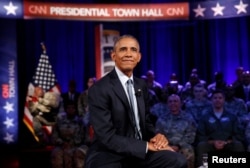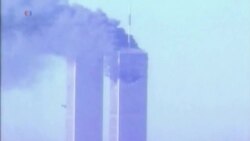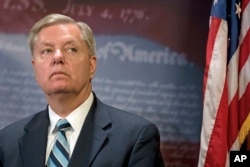The U.S. Congress has voted to override President Barack Obama’s veto of a bill that would allow lawsuits against Saudi Arabia for the terrorist attacks of September 11, 2001. Wednesday’s tallies in both houses of Congress were overwhelming and marked the first time an Obama veto has been overturned.
In the Senate, Democratic Minority Leader Harry Reid of Nevada was the lone member to side with the president. The House vote was 348-77.
The outcome is a major victory for the families of those killed in the terrorist attacks of September 11, 2001. Until now, their efforts to seek justice in U.S. courts have been stymied by Saudi Arabia’s legal immunity.
Obama told CNN television that Congress' decision to let the lawsuits go ahead is "a mistake."
He said the 9/11 victims and their families deserve support and compensation from a fund set up by his administration. But he said allowing private citizens to sue a country for allegedly not doing enough to stop a terrorist could come back to hurt the U.S.
"If we eliminate this notion of sovereign immunity, then our men and women in uniform around the world could potentially start seeing ourselves subject to reciprocal laws," Obama said. "It has to do with me not wanting a situation in which we're suddenly exposed to liabilities for all the work we're doing around the world."
The Justice Against Sponsors of Terrorism Act permits lawsuits against foreign entities that sponsor terrorist attacks on U.S. soil. Although the bill names no specific country, it is widely seen as an effort to hold Saudi Arabia accountable for any assistance the 9/11 plotters may have received from within the kingdom.
“These families will never get back their loved ones, but they deserve justice and a day in court,” said Democratic Senator Richard Blumenthal of Connecticut.
“The American interest here is for these victims of terrorism to find recourse in our courts of law,” concurred Republican John Cornyn of Texas.
White House Warnings on Repercussions
The Obama administration lobbied strenuously against JASTA, arguing it would endanger Americans abroad by undercutting the concept of sovereign immunity on the world stage.
“The United States of America is more deeply engaged in more countries around the world than any other country in the world,” said White House spokesman Josh Earnest. “So carving out additional exceptions to sovereign immunity puts the United States at greater risk than any other country in the world.”
Similarly, CIA Director John Brennan warned of “grave implications for the national security of the United States” in a statement issued as the Senate prepared to vote.
“The principle of sovereign immunity protects U.S. officials every day, and is rooted in reciprocity. If we fail to uphold this standard for other countries, we place our own nation’s officials in danger,” Brennan said.
Republican Senator Lindsey Graham of South Carolina voted to override the veto, but said he shared the administration’s concern.
“We’ve got diplomats and soldiers and American business people all over the world. So we need to think long and hard about making sure we don’t open up Pandora’s box to our own people,” Graham said, adding that there could be diplomatic fallout between Washington and Riyadh.
“I’m worried that Saudi Arabia will see this as the Congress finding them guilty of being involved in 9/11. That’s not what this [bill] is about,” Graham said.
“Saudi Arabia or some other country might be upset. Well, frankly, I could care less,” Cornyn said. “We’re here to represent the American people, not some foreign country.”
Saudi officials have reportedly told U.S. lawmakers that the kingdom would be forced to sell up to $750 billion in treasury securities and other assets in the United States before they could be frozen or seized by U.S. courts. Some economists are skeptical, saying Riyadh's economy could be put at risk by such a move.
Fifteen of the 19 hijackers on 9/11 were Saudi citizens, but Saudi Arabia has long denied any role in the attacks, an assertion Blumenthal, a former federal prosecutor, finds unpersuasive.
“There is mounting evidence that the Saudi government, or at least organizations and operatives within the Saudi government, aided and abetted one of the most massive crimes within the United States,” Blumenthal said. “If the Saudi government had no involvement in 9-11, it has nothing to fear [from lawsuits].”
“I don’t believe the government of Saudi Arabia was responsible for 9/11, but they will have their day in court,” Graham said.
JASTA’s resurrection on Capitol Hill was hailed by the family members of 9/11 victims, many of whom made repeated trips to Washington to tell their stories and demand that the bill become law.
“My father will never see me graduate college or walk me down the aisle one day,” said Kaitlyn Strada, whose father, Tom Strada, died in New York’s World Trade Center. She added that victims’ families “deserve opportunities to hold those responsible for the death, pain and suffering inflicted on all of us at the hands of terrorism.”
“Fifteen years is far too long for us to have to wait already,” Strada said at a news conference outside the Capitol last week.








